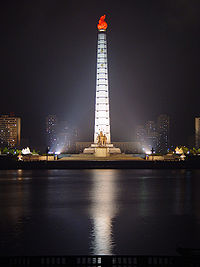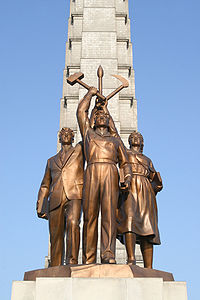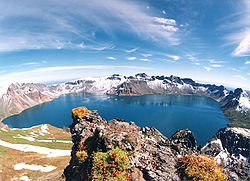- Tourism in North Korea
-
Organized by the state owned Korea International Travel Company, Tourism in North Korea is highly controlled by the government, and as such it is not a frequently visited destination — roughly 1,500 Western tourists visit North Korea each year, along with thousands of Asians.[1] Tourists must go on guided tours and must have their tour guides with them at all times. As of June 2011, the Northern border to China has been opened and Chinese citizens are free to drive their own vehicles to Luo, a North Korean Northeast border region small town where they are free to explore, mingle and photograph. This is seen as the first steps towards expanded tourism and development in that region. Photography is strictly controlled, as is interaction with the local population.[1] Koryo Tours (who have been running North Korea tourism and cultural exchanges since 1993), Cgtt Voyages, Chugai Travel, Korea Konsult, Korean Friendship Association, New Korea Tours, Regent Holidays (UK) and Nordkorea-Info.de (Germany) are specialised in visits to the Democratic People's Republic of Korea (also known as North Korea).
Contents
Visa
In principle, any person is allowed to travel to North Korea, and only South Koreans and journalists are routinely denied. The visa application process is complex. Special travel agents can help potential visitors through the bureaucratic process. Visitors are not allowed to travel outside designated tour areas without their Korean guides.[1]
Prior to 2010,[2] tourists holding United States passports were not granted visas, except during the Arirang Festival mass games (아리랑 축제).[3] U.S. citizens, journalists and citizens from other nations have also been given special permission to enter as members of the Korean Friendship Association and Choson Exchange[4]. Citizens of South Korea require special permission from both governments to enter North Korea, and are typically not granted such permission for regular tourism except in special tourist areas designated for South Koreans.
Tours from South Korea
In 2002, the area around Mount Kŭmgang, a scenic mountain close to the South Korea border, was designated as a special tourist destination. Tours run by private companies brought thousands of South Koreans to Mount Kŭmgang every year[5] prior to the suspension of tours in late 2008 due to the shooting of a South Korean tourist.[6] When tours had still not resumed by May 2010, North Korea unilaterally announced that it would seize South Korean real estate assets in the region.[7]
In July 2005, the South Korean company Hyundai Group came to an agreement with the North Korean government to open up more areas to tourism, including Baekdu Mountain (백두산) and Kaesong (개성). Kaesong was finally opened to daily tours for South Korean and foreign tourists in December 2007; North Korea charged US $180 for a one-day trip. The city received several hundred tourists each week, mostly South Koreans.[4]
The tours to Kaesong were suspended in December 2008 due to a political conflict between North and South Korean relating to propaganda balloons. The balloons, filled with information critical of Kim Jong Il and the North Korean regime, were sent into North Korea from just south of the border in South Korea. When South Korea did not respond to North Korean demands to stop the propaganda balloons, North Korea suspended the Kaesong tours.[8] The tours to Kaesong resumed in April 2010, but were again suspended in May 2010 following the ROKS Cheonan sinking.
Tours from China
In April 2010, the first tourist trains from China brought visitors to North Korea for a 4-day tour.[9]
In June 2011, Chinese citizens were allowed on a self-drive tour in North Korea for the first time in history.[10]
The number of Chinese tourists visiting North Korea has fallen 70 percent from 2010 to 2011. One Chinese travel agency cited the limited number of packages and restrictions on where foreign tourists can travel as the main reasons for the lack of interest. Only the capital Pyongyang and Mt. Kumgang are available on Chinese itineraries.[11]
See also
References
- ^ a b c McGeown, Kate (2003-09-17). "On holiday in North Korea". BBC News. http://news.bbc.co.uk/2/hi/asia-pacific/3113352.stm. Retrieved 2008-01-04.
- ^ Anderson, Chris (2010-01-15). "Visit anytime! North Korea lifts restrictions on U.S. tourists". CNNGo. http://www.cnngo.com/explorations/none/north-korea-lifts-travel-restrictions-americans-529062. Retrieved 2010-01-21.
- ^ "US tourists can visit DPRK for mass games". People's Daily Online. 2005-09-23. http://english.people.com.cn/200509/23/eng20050923_210414.html. Retrieved 2008-09-16.
- ^ a b "Choson Exchange FAQ". http://chosonexchange.org/?page_id=23.
- ^ "Tourism boost to North in works". Joongang Ilbo. 2008-02-06. http://joongangdaily.joins.com/article/view.asp?aid=2885975. Retrieved 2008-09-16.
- ^ "S Korea hopes DPRK to begin dialogue over S Korean tourist shot dead". chinaview.cn. http://news.xinhuanet.com/english/2009-07/10/content_11686216.htm. Retrieved 2009-07-12.[dead link]
- ^ http://english.chosun.com/site/data/html_dir/2010/04/09/2010040900476.html
- ^ "Propaganda posted in helium balloons sparks border closure from N Korea". France24 Daily. 2008-11-24. http://observers.france24.com/en/content/20081124-propaganda-posted-helium-balloons-sparks-border-closure-north-korea. Retrieved 2009-03-22.
- ^ Mu, Xuequan (2010-04-25). "China's first tourist train to DPRK starts 4-day tour". Xinhua. http://news.xinhuanet.com/english2010/travel/2010-04/25/c_13265984.htm.
- ^ Nick Rowlands, Reuters.com "Chinese motorists tour North Korea" Published 15 June 2011. http://www.reuters.com/video/2011/06/15/chinese-motorists-tour-north-korea?videoId=215962520&videoChannel=1
- ^ "Chinese Tourists to N.Korea Dwindling". The Chosunilbo. 2011-10-10. http://english.chosun.com/site/data/html_dir/2011/10/05/2011100501172.html. Retrieved 2011-10-09.
External links
- Visit North Korea and learn about the country [1]
- Documentary films on North Korea, The Game of their Lives, A State of Mind and Crossing the Line [2]
- The Guardian Travel story to North Korea [3]
- Travel show on North Korea with Koryo Tours and Destinations tv [4]
- Images of tourism in North Korea [5]
Economy of North Korea General topics - Automotive industry
- Central Bank of DPRK
- Juche
- Kaesong Industrial Region
- Kohas
- Korean Peninsula Energy Development Organization
- North Korean won
- Nuclear power
- Rajin-Sonbong Economic Special Zone
- Room 39
- Ryonbong
- Sili Bank
- Songun
- Superdollar
- Yongbyon Nuclear Scientific Research Center
- Tourism
- Transport
lists and categories  List of North Korean companies
List of North Korean companies Nuclear power stations in North Korea
Nuclear power stations in North Korea
Tourism in Asia Sovereign
states- Afghanistan
- Armenia
- Azerbaijan
- Bahrain
- Bangladesh
- Bhutan
- Brunei
- Burma (Myanmar)
- Cambodia
- People's Republic of China
- Cyprus
- East Timor (Timor-Leste)
- Egypt
- Georgia
- India
- Indonesia
- Iran
- Iraq
- Israel
- Japan
- Jordan
- Kazakhstan
- North Korea
- South Korea
- Kuwait
- Kyrgyzstan
- Laos
- Lebanon
- Malaysia
- Maldives
- Mongolia
- Nepal
- Oman
- Pakistan
- Philippines
- Qatar
- Russia
- Saudi Arabia
- Singapore
- Sri Lanka
- Syria
- Tajikistan
- Thailand
- Turkey
- Turkmenistan
- United Arab Emirates
- Uzbekistan
- Vietnam
- Yemen
States with limited
recognition- Abkhazia
- Nagorno-Karabakh
- Northern Cyprus
- Palestine
- Republic of China (Taiwan)
- South Ossetia
Dependencies and
other territoriesCategories:
Wikimedia Foundation. 2010.



